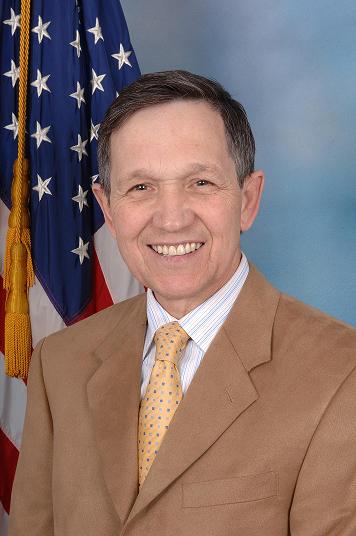March 31, 2011
As Prepared for Delivery--
Mr. Speaker. The critical issue before this nation today is not Libyan democracy, it is American democracy. In the next hour I will describe the dangers facing our own democracy. The principles of world democracy are embodied in the UN Charter, conceived to end the scourge of war for all time. The hope that nations could turn their swords into plowshares reflects the timeless impulse of humanity for enduring peace and with it an enhanced opportunity to pursue happiness.
We are not na????ve about the existence of forces in the world which work against peace and against human security, but it is our fervent wish that we shall never become like those whom we condemn as lawless and without scruples. For it is our duty as members of a democratic society to provide leadership by example, to not only articulate the highest standards but to walk down the path to peace and justice with those standards as our constant companions. Our moral leadership in the world depends chiefly upon the might and light of truth and not shock and awe, and ghastly glow of our 2,000 lb bombs.
Our dear nation stands at a crossroads. The direction we take will determine not what kind of nation we are but what kind of nation we will become. Will we become a nation which plots in secret to wage war? Will we become a nation that observes our Constitution only in matters of convenience? Will we become a nation which destroys the unity of the world community painstakingly pieced together from the ruins of World War II, a war which itself followed a war to end all wars?
Now, once again we stand poised at a precipice -- forced to the edge by an Administration which has thrown caution to the winds and our Constitution to the ground.
It is abundantly clear from a careful reading of our Declaration of Independence that our nation was born from nothing less than the rebellion of the human spirit against the arrogance of power.
More than 200 years ago it was the awareness of the unchecked arrogance of King George III that led our Founders to deliberately and carefully balance our constitution by articulating the rights of Congress in Article I, as the primary check by our citizens against the dangers they foresaw for our republic. Our constitution was derived from the human and political experience of our Founders who were aware of what happens when one person takes it upon himself or herself to assume rights and privileges which place them above their fellow citizens.
"But where," asked Tom Paine in his famous tract, Common Sense, --is the king of America? I'll tell you Friend, he reigns above, and doth not make havoc of mankind like the Royal of Britain . . . . so far as we approve of monarchy, that in America the law is king. For as in absolute governments the king is law, so in free countries the law ought to be king; and there ought to be no other."
The power to declare war is firmly and explicitly vested in the Congress of the United States under Article I, Section 8 of the Constitution.
Let us make no mistake about it, dropping 2000 lb bombs and unleashing the massive firepower of our air force on the capital of a sovereign state is in fact an act of war and no amount of legal acrobatics can make it otherwise.
It is that same arrogance of power which the former Senator from Arkansas, J. William Fulbright, saw shrouded in the deceit which carried us into the abyss of the war in Vietnam. We determined we would never again see another Vietnam. It was the awareness of the unchecked power and arrogance of the executive which led Congress to pass the War Powers Act.
The Congress through the War Powers Act provided the executive with an exception to unilaterally respond only when the nation was in actual or imminent danger; to "repel sudden attacks."
Today we are in a constitutional crisis because our chief executive has assumed for himself powers to wage war which are neither expressly defined nor implicit in the Constitution, nor permitted under the War Powers Act.
This is a challenge not just to the Administration, but to Congress itself:
(Note: You can view every article as one long page if you sign up as an Advocate Member, or higher).





